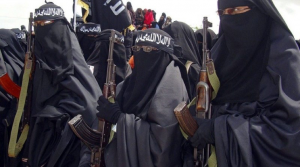
Women’s Roles in Al-Shabaab: Deeper Understanding and Research Is Needed

The ‘daughters’ of Al-Shabaab, armed with assault rifles. Credit for image and caption: Al Jazeera.
In April 2019, it was reported that recent studies over-emphasise the role of men in terrorism, therefore overlooking and underestimating the influence of women. Accounting for over 15-25% of membership in terrorist organisations, women possess a significant role in the recruitment, operations and delegation of terrorist groups, to name a few.
Data originating from the Western Jihadism Project revealed that the role of women in such organisations take the form of traditional gender roles, where women are less likely to be involved in the planning of attacks, and more likely to support the organisation “behind the scenes”. Given this context, this piece will explore the role of women, specifically within the Al-Shabaab.
A woman in the Al-Shabaab operating in Kenya participated in an interview held in 2015 with an Al-Jazeera reporter. She recounted to have given shelter to Al-Shabaab members, whilst they referred to her by the name “Mother”. This woman also stated that she remembers providing accommodation to a young man named Ikrima. Ikrima would later be identified as one of the planners of Westgate Mall attack in Nairobi that left over 67 people dead.
Consistent with this woman’s account, it is identified that women in the Al-Shabaab play the role as “wives” of fighters, and partake in domestic activities. Women in the Al-Shabaab are reported to also be used as sex slaves, in addition to helping to attract new recruits. These women are often tricked into the Al-Shabaab by being lured with the prospect of employment, counselling or financial support. Some of these women who escaped have shared their stories, though they lived with the lifelong emotional, psychological and even physical scars inflicted upon them by the group.
In 2017, one woman stated that she had fell victim to this luring, and shared her account of the horrors she experienced while she was forced into sexual slavery by the Al-Shabaab. This woman recounts being smuggled from Kenya into Somalia and was brutally beaten and raped by as many as six Al-Shabaab men. One day, when the camp was empty of men, she managed to escape and encountered authorities who helped her to a hospital and eventually back to Kenya. She later learned that she was infected with HIV. The Al-Shabaab are reported to use women in sexual slavery to control the breeding of the next generation.
With consideration to the foregoing, not all women within the Al-Shabaab are tricked or lured into operating with the group. Recent studies have shown that there exists women voluntarily travel to Somalia to support the group’s agenda. A ‘key aspect’ to the Al-Shabaab’s operations is that Somali officials (such as officers or border control agents) do not recognise nor do they perceive women as a threat, allowing women to seamlessly pass through security checks. Therefore, women are often tasked with the transport and smuggling of weapons and go undetected at checkpoints. They are also tasked with gathering intelligence and information for the Al-Shabaab, as their manoeuvres and actions as women often pass without arousing suspicion.
The concern raised here is that the role of women within the Al-Shabaab remains under-reported, overlooked and rather unexplored. Continued research and analysis should be therefore encouraged regarding the significance of the role of women in the Al-Shabaab. Moreover, it must be emphasized that not all women within the Al-Shabaab are working with the group voluntarily, and a greater issue that must be addressed are the women who voluntarily join the group.
It has been reported than many young women specifically from Kenya travel to Somalia to join the group. These women often feel helpless in their former communities, and severe poverty often push them to join the Al-Shabaab. Another motive for women joining the group are their feelings of resentment towards Kenyan authorities who may have mistreated their sons or husbands. Joining the Al-Shabaab is therefore a form of retaliation and revenge, and analysts have even reported that for these women, joining the group is a form of empowerment.
However, as previously mentioned, once these women have experienced the reality of their role within the group (the brutal treatment and being forced into sexual slavery), women are left with two core choices: either remain in the group or attempt to return to Kenya. Those who remain in the group have reported that they stay because of fear or hopelessness. Those who attempt to return to Kenya face difficulty in returning to their former communities, and even face extrajudicial killings by Kenyan authorities if it is discovered that they were in Somalia assisting the Al-Shabaab.
The vulnerability and precarity of women’s roles in the Al-Shabaab necessitates more profound research, and equal recognition when conducting studies related to the group’s operations. Although not all women are tricked into joining the extremist group, resources can be made available to all women to provide education of the realities of the horrors of the Al-Shabaab. It has even been suggested that Somali forces should encourage more female presence of officers within their commands, to empower women and to demonstrate that there are options to empowerment, and that they need not to join the group.
